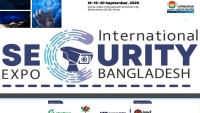
বুধবার ● ৯ ডিসেম্বর ২০১৫
প্রথম পাতা » English » Interview of Paul Wilson, the Director General of Asia Pacific Network Information Centre (APNIC)
Interview of Paul Wilson, the Director General of Asia Pacific Network Information Centre (APNIC)

Recently, Senior Journalist Md. Kawsar Uddin visited Joao Pessoa, Brazil for attending the Internet Governance Forum (IGF) 2015. During the conference, Mr. Kawsar Uddin talked with Mr. Paul Wilson, the Director General of Asia Pacific Network Information Centre (APNIC) to know about his views about the present and future of Internet as well as issues relating to IGF. Here is a brief account of the interview.
Paul Wilson has 25 years’ involvement with the Internet and over 16 years as the head of APNIC, the Regional Internet address Registry for the Asia Pacific. In this role, he has led APNIC’s development as a provider of critical Internet services and as a key contributor to Internet growth and development throughout the Asia Pacific. Paul has worked as an expert and leader across the full range of communities and organisations involved in Internet development, including ISPs and network operators, non-profit organisations, Governments and governmental agencies; and with many key organisations including RIRs, IETF, ICANN, ISOC, APEC-TEL, ITU and others.
As a highly respected member of the global Internet community, Paul participates in the following organizations:
Chair, Multi-stakeholder Steering Group for APrIGF
Executive Committee, Asia Pacific Networking Group (APNG)
Grants Evaluation Committee, Information Society Innovation Fund (ISIF)
Executive Council, Number Resource Organization (NRO)
Advisory Committee, Internet Society (ISOC)
Advisory Committee, DotAsia Organisation (.Asia)
Question: What is your observation about the overall Internet infrastructure in Bangladesh? How do you view the Internet Operational Community of Bangladesh?
Paul Wilson: I think it’s growing very fast; I will be very interested to see the status and how things are going with the meeting that we have next year. APNIC is taking different measures for tracking Internet growth and penetration in the country including important issues like the IPV6 growth and penetration. Another important issue is the security and stability of the domain name system. I think it is increasing in both cases. Bangladesh is a country with a huge amount of growth potential and it also has a diverse internet industry. BdNOG is a fantastic community organization that is really important to maintain healthy growth of Internet in Bangladesh. Because it allows the operators to come together and share the experiences and also make the connections between networks that is very important to ensure the stability of Bangladesh’s Internet. So I really think that if you are speaking about the growth of the Internet, it’s really useful to talk about the growth of the industry and the community. BdNOG is a very good example, not every country has a NOG. Bangladesh has NOG and it’s really quite active. So, I think Bangladesh will do very well in near future.
Question: What are your observations about the Internet operational community in Bangladesh?
Paul Wilson: I think in case of Internet Operational Community, Bangladesh is very much in the right path. But there needs to be a policy environment to encourage the competition and entry into the market. Internet use should be at a very low cost and out of all kinds of barriers or very low barriers.
Question: How do you view the ‘Zero Internet’ initiative?
Paul Wilson: It is hard to make comment from APNIC regarding this. But I think our mission is very clear in terms of an open, stable, secure and global internet. It is important to understand that, by nature Internet is neutral.
Question: APNIC 42 will be held in Bangladesh next year, What is your expectation form this? How Bangladeshi Policy makers and internet community will get benefit from the conference?
Paul Wilson: I would like to hope that we will be working very closely with the local industry, with local internet community in particular and expect to have a very successful meeting. As lots of expert of from other countries will participate in the APNIC 42 event, Bangladeshi Internet community will be benefited from expert communities from other parts of the world.
I think it’s important for the policy-makers to see the Internet in action. It’s the community, companies and individuals who have to come together to build the Internet better, faster, cheaper, more efficient, more stable and so on. It’s important for the regulators and government to understand that the Internet is a bottom up process. We welcome policy makers to the event to share and discuss about the issues related to Bangladesh.
Question: What is the future direction of IGF globally? How can the Internet community in Bangladesh including the government can be more involved and active in IGF?
Paul Wilson: We are now in the 10th IGF meeting and that’s the last IGF meeting of the current mandate of United Nations. So the decision needs to be made in December by the UN about the future of IGF. Since decision in not made yet, it is hoped that IGF will be extended for another 5 or 10 years. So, we should have IGF again next year and another next few years. That is very important because the Internet is growing very rapidly, many new policy issues are coming up. IGF should come with the idea like whether there is problem and whether there is solution.
There are National IGF meetings in different countries, there are regional IGF meetings in different regions and also the global meeting. So, it is possible to participate in three levels and to learn and also to contribute at multiple levels. The IGF process is information sharing and a sort of education as well, it’s also very good way for communities to learn about new issue. IGF is not a decision making forum but decision makers participate here and they can make better decision by being involved with the process.
Question: Is there any specific plan to support country level IGF from regional IGF or Global IGF?
Paul Wilson: There are something now which is called the IGF Support Association which is in fact a new funding agency. It is providing small amount of financial supports which can really help to kick-start and maintain IGF. Other global agencies, bodies, global organizations may also provide some supports. But the important thing is if you have a national IGF it needs to be supported by nationally, locally and preferably by the community. Normally a successful IGF might have a government contribution, industry contribution and then some external contributions as well.
Question: We hope the mandate of IGF may extend. Then what should be the priorities for next the couple of years?
Paul Wilson: All of the different issues of the security and stability of the Internet is very important. This is not only one issue, one security issue - many different aspects like unsolicited communications, cyber-attacks, technical robustness of Internet, human capacity building etc. will need to be taken account. If you want a secure internet, you need very well trained capable people. I hope IGF MAG will work to set the priorities after the event.
Question: What is your opinion about the participation of non-technical persons (policy makers, journalists, civil society) in the technical program like APNIC/ICANN conferences? How can we increase their participation?
Paul Wilson: We should encourage non-technical persons to participate in these events. We can design some sessions for targeting the people from government, law enforcement agency and civil society etc.





 Shaila Sharmin re-elected as APNIC Policy SIG co-chair
Shaila Sharmin re-elected as APNIC Policy SIG co-chair  Bangladesh-China Apon Media Club and TMGB Sign MoU to Enhance Tech News Exchange
Bangladesh-China Apon Media Club and TMGB Sign MoU to Enhance Tech News Exchange  The Protocol Revolution: How Bangladesh can be a part of this journey
The Protocol Revolution: How Bangladesh can be a part of this journey  From Everest to Maldives: The Story of Community Networks in Remote Areas
From Everest to Maldives: The Story of Community Networks in Remote Areas  Russia to host World Digital Forum 2025
Russia to host World Digital Forum 2025  ICANN’s Multi-Stakeholder Approach and Bangladesh’s Role
ICANN’s Multi-Stakeholder Approach and Bangladesh’s Role  The Invisible Backbone: Why Bangladesh is falling behind in the Internet Revolution
The Invisible Backbone: Why Bangladesh is falling behind in the Internet Revolution  Applications for the 2025 APNIC Fellowship program are now open
Applications for the 2025 APNIC Fellowship program are now open  We work together with Bangladesh Community to move IPv6 adoption forward: Jia Rong
We work together with Bangladesh Community to move IPv6 adoption forward: Jia Rong  Signing Ceremony of MoU Between BIGF & ISOC Bangladesh
Signing Ceremony of MoU Between BIGF & ISOC Bangladesh 






